If you want to know about the rating process and rating structure of GRIHA or about the green building or energy optimization, please click the link.
Energy Conservation Building Code (ECBC) is a set of guidelines and regulations set by the government of India to promote energy efficiency and reduce greenhouse gas emissions in buildings.
The ECBC aims to reduce the energy consumption of buildings and ensure that they are designed and constructed in a manner that reduces their environmental impact.
- The purpose of the Energy Conservation Building Code (Code) is to provide minimum requirements for the energy-efficient design and construction of buildings.
- The Code also provides two additional sets of incremental requirements for buildings to achieve enhanced levels of energy efficiency that go beyond the minimum requirements.
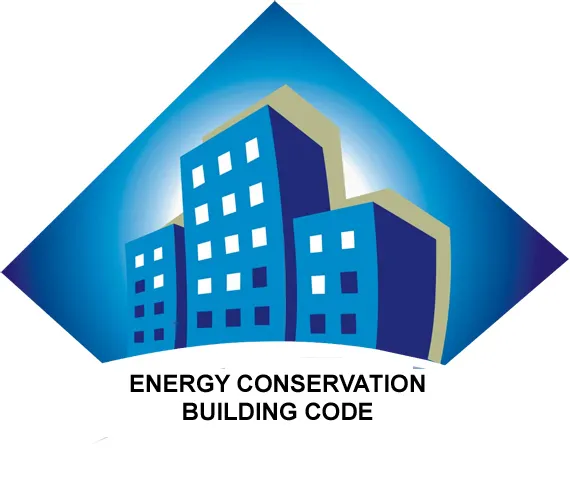
1) ECBC
The ECBC lays down requirements for the design and construction of buildings that include provisions for efficient use of energy, such as the use of energy-efficient appliances, lighting systems, and building envelopes, among others.
It also requires the use of renewable energy sources, such as solar energy, where feasible. The code provides guidelines for both residential and commercial buildings, and it is mandatory for new construction projects in India.
The implementation of the ECBC is expected to result in significant energy savings, reduce greenhouse gas emissions, and promote sustainable development. It is also expected to create opportunities for the development of new technologies and products that support energy efficiency in buildings.
Here’s more information on the Energy Conservation Building Code:
- Compliance: The ECBC applies to all new commercial buildings and buildings undergoing major renovations. It also applies to new residential buildings that are three or more stories tall. Compliance with the ECBC is mandatory and must be verified by an accredited energy auditor.
- Energy Efficiency Measures: The ECBC requires the implementation of various energy efficiency measures in buildings, including efficient building envelopes, HVAC systems, lighting, and hot water systems. For example, the code requires buildings to have high-performance insulation, efficient windows, and proper ventilation to reduce energy losses.
- Renewable Energy: The ECBC encourages the use of renewable energy sources in buildings, such as solar panels and wind turbines. It requires buildings to have the necessary infrastructure and connections to support the use of renewable energy.
- Monitoring and Verification: The ECBC requires ongoing monitoring and verification of energy consumption to ensure that buildings continue to operate in an energy-efficient manner. Building owners are required to submit annual energy consumption reports to the government to demonstrate their compliance with the code.
- Economic Benefits: The implementation of the ECBC is expected to bring significant economic benefits, including reduced energy costs, increased property values, and increased competitiveness in the global marketplace. Additionally, it is expected to create new jobs in the energy efficiency and renewable energy industries.
ECBC prescribes standards for
- Building Envelope (Walls, Roofs, Windows) Lighting (Indoor and Outdoor)
- Heating Ventilation and Air Conditioning (HVAC) System
- Solar Hot Water Heating
- Electrical Systems
2) Purpose of ECBC
The purpose of the Energy Conservation Building Code (ECBC) is to promote energy efficiency in buildings and to reduce energy consumption and greenhouse gas emissions. The primary objectives of the ECBC are to:
- Reduce Energy Consumption: The ECBC sets standards for the design and construction of buildings that aim to reduce energy consumption and promote energy efficiency. By requiring the implementation of energy-efficient technologies and practices, the code helps to reduce the energy needs of buildings and conserve energy resources.
- Promote Sustainability: The ECBC aims to promote sustainable development by reducing the environmental impact of buildings. By encouraging the use of renewable energy sources, such as solar panels and wind turbines, the code helps to reduce greenhouse gas emissions and promote a more sustainable future.
- Encourage Innovation: The ECBC encourages the development of new technologies and products that support energy efficiency in buildings. This can lead to the creation of new job opportunities and the development of a robust energy efficiency market.
- Increase Energy Awareness: The ECBC helps to increase energy awareness among building owners, designers, and construction professionals. By promoting energy-efficient practices and technologies, the code helps to raise awareness about the importance of energy conservation and sustainability.
- Improve Economic Competitiveness: The ECBC is expected to bring significant economic benefits, including reduced energy costs, increased property values, and increased competitiveness in the global marketplace. Additionally, the code is expected to create new jobs in the energy efficiency and renewable energy industries.
i) Key objectives of ECBC 2017 development
- Set a long term vision for building energy efficiency
- Include new types of buildings
- Focus on design strategies for reducing energy use
- Establish a baseline of energy performance and promote buildings that go beyond the code
- Ease of compliance and enforcement
ii) Typical Electricity Use in Buildings
- Application of building codes reduces electricity consumption by 25% – 30%

3) Scope of ECBC
The scope of the Energy Conservation Building Code (ECBC) applies to new commercial buildings and buildings undergoing major renovations. The code also applies to new residential buildings that are three or more stories tall.
The ECBC lays down requirements for the design and construction of buildings that aim to promote energy efficiency and reduce energy consumption and greenhouse gas emissions.
- The ECBC covers a wide range of topics, including building envelopes, heating, ventilation, and air conditioning (HVAC) systems, lighting, hot water systems, and renewable energy.
- The code provides specific requirements for each of these areas, including requirements for building insulation, efficient windows, efficient HVAC systems, and the use of energy-efficient lighting and appliances.
- The ECBC also covers the use of renewable energy in buildings, requiring the necessary infrastructure and connections to support the use of solar panels, wind turbines, and other renewable energy sources.
- The code also requires ongoing monitoring and verification of energy consumption to ensure that buildings continue to operate in an energy-efficient manner.
- The ECBC applies to all new commercial and residential buildings in India and is mandatory for new construction projects.
- Compliance with the code must be verified by an accredited energy auditor and building owners must submit annual energy consumption reports to the government to demonstrate their compliance with the code.
4) Energy efficiency requirements for the Code
The Energy Conservation Building Code (ECBC) sets specific energy efficiency requirements for new commercial and residential buildings in India, as well as for buildings undergoing major renovations. The following are some of the key energy efficiency requirements of the ECBC:
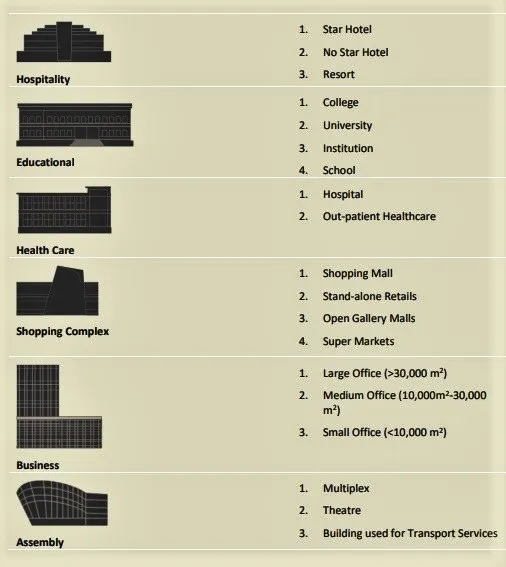
- Building Envelope: The ECBC requires that buildings have a high-performance building envelope to reduce energy losses. Requirements include insulation in walls, roof, and floors, efficient windows and doors, and proper ventilation to reduce air infiltration.
- Heating, Ventilation, and Air Conditioning (HVAC) Systems: The code requires that HVAC systems be designed and installed to be energy-efficient. Requirements include the use of high-efficiency air conditioners, heat recovery systems, and efficient ventilation systems.
- Lighting: The ECBC requires the use of energy-efficient lighting systems, such as LED lights, to reduce energy consumption. The code also sets requirements for lighting controls, such as occupancy sensors and daylight sensors, to ensure that lighting is used only when needed.
- Hot Water Systems: The code requires the use of efficient hot water systems, such as solar water heaters and heat pump water heaters, to reduce energy consumption.
- Renewable Energy: The ECBC encourages the use of renewable energy sources in buildings, such as solar panels and wind turbines. Requirements include the necessary infrastructure and connections to support the use of renewable energy.
- Monitoring and Verification: The ECBC requires ongoing monitoring and verification of energy consumption to ensure that buildings continue to operate in an energy-efficient manner. Building owners are required to submit annual energy consumption reports to the government to demonstrate their compliance with the code.
5) Compliance and approach
Compliance with the Energy Conservation Building Code (ECBC) is mandatory for new commercial and residential buildings in India and for buildings undergoing major renovations.
The ECBC provides a comprehensive framework for designing and constructing energy-efficient buildings and requires that buildings meet specific energy efficiency standards and requirements.
To ensure compliance with the ECBC, building owners must engage an accredited energy auditor to verify that their building meets the code’s requirements.
The energy auditor will assess the building’s energy performance, including its heating, ventilation, and air conditioning (HVAC) systems, lighting, hot water systems, and renewable energy systems, to ensure that they meet the code’s requirements.
i) Compliance and Approach
- Energy Performance Index Ratio (EPI Ratio) is less than or equal to 1.
- The Energy Performance Index (EPI) of a building is its annual energy consumption in kilowatt-hours per square meter of the building.
- While calculating the EPI of a building, the area of unconditioned basements shall not be included.

ii) Determining EPI Ratio
- The EPI Ratio of a building is the ratio of the EPI of the Proposed Building to the EPI of the Standard Building:

6) Building Envelope
Mandatory Requirements
- Fenestration ( U-Factor, Solar Heat Gain Coefficient, Visual Light Transmittance)
- Opaque Construction
- Day lighting



7) Comfort Systems and Controls
Mandatory Requirements
- Ventilation
- Condensers
- Service Water Heating
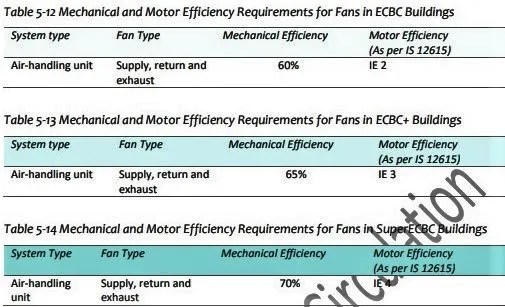
8) Lighting and Controls
Mandatory Requirements
- Lighting Control
- Interior Lighting Power
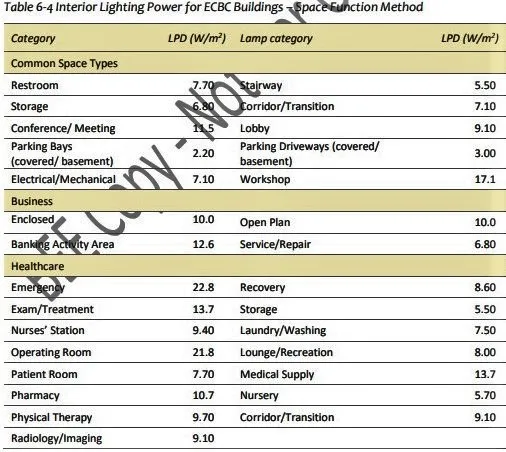
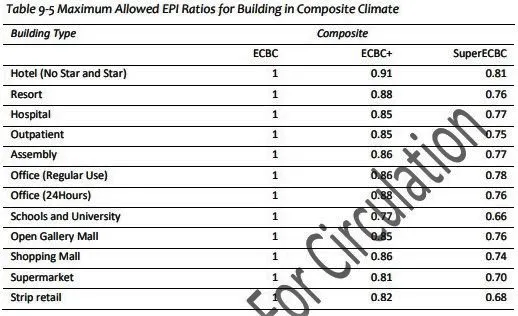
9) ECBC Impact
The Energy Conservation Building Code (ECBC) has had a significant impact on the construction of new commercial and residential buildings in India.
By setting specific energy efficiency requirements for new buildings, the ECBC helps to reduce energy consumption, greenhouse gas emissions, and costs associated with heating, ventilation, and air conditioning (HVAC) systems, lighting, hot water systems, and renewable energy systems.
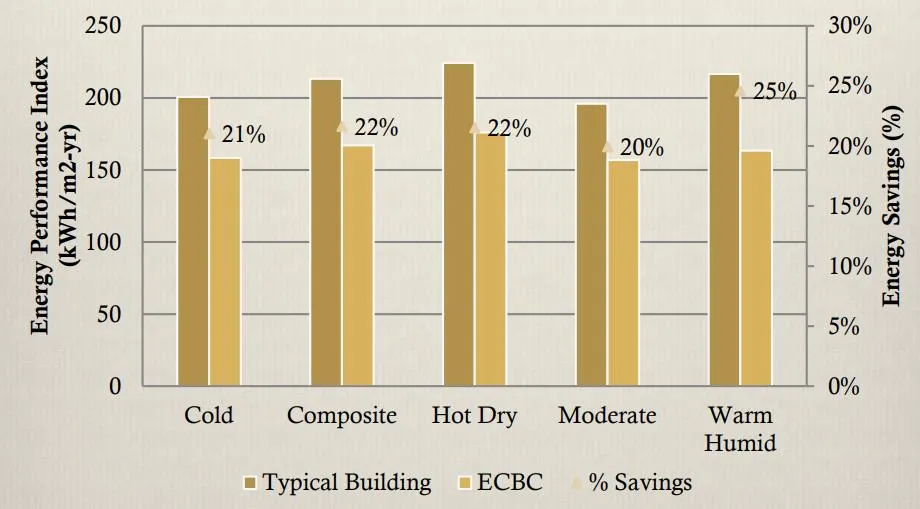
- Energy Savings: The ECBC has helped to reduce energy consumption in buildings, resulting in significant energy savings for building owners. By promoting the use of energy-efficient technologies and practices, such as high-efficiency HVAC systems, LED lighting, and solar hot water systems, the code has helped to reduce energy consumption and costs associated with energy use.
- Greenhouse Gas Emissions Reduction: By reducing energy consumption in buildings, the ECBC has helped to reduce greenhouse gas emissions, making a positive contribution to the environment and mitigating the effects of climate change.
- Economic Benefits: The ECBC has helped to promote economic competitiveness by reducing energy costs for building owners. The use of energy-efficient technologies and practices can result in lower energy bills, freeing up resources for other investments and improving the bottom line for building owners.
- Job Creation: The ECBC has helped to create jobs in the energy-efficient construction and building technologies sectors, as well as in the renewable energy sector, by promoting the use of energy-efficient technologies and practices.
- Improved Indoor Environmental Quality: The ECBC has helped to improve indoor environmental quality by promoting the use of efficient HVAC systems, lighting, and hot water systems, and by reducing air infiltration. This has resulted in healthier, more comfortable indoor environments for building occupants.
In conclusion, the ECBC has had a significant impact on the construction of new commercial and residential buildings in India, helping to reduce energy consumption, greenhouse gas emissions, and costs, while promoting economic competitiveness, job creation, and improved indoor environmental quality.